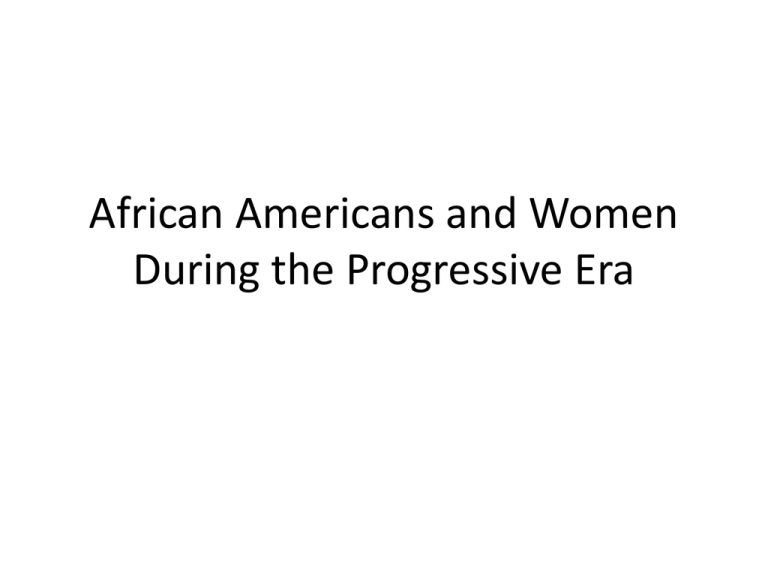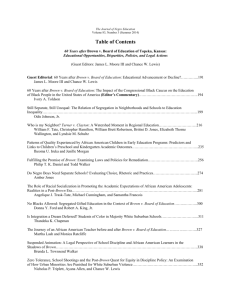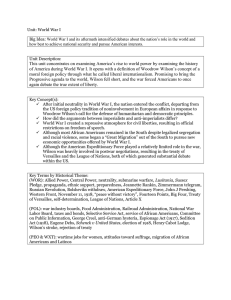APUS Unit 7 African Americans and Women During the Progres
advertisement

African Americans and Women During the Progressive Era • Industrialization led to smaller families and greater opportunities for women to work outside of the home • Jobs were mainly in the textile industry, although women also worked as telephone operators, secretaries and typists. • Women’s universities opened throughout the nation. • International Ladies’ Garment Workers Union Triangle Shirtwaist Factory Fire • • • • 1911 Windows, doors and fire exits were blocked 146 women died Led to greater reforms in the conditions of garment factories in NY • Mother Jones continued to work for the rights of railroad workers and coal miners. Political Rights • 1900- Carrie Chapman Catt became president of the National American Woman Suffrage Association – Argued that if women were given the right to vote, they could support Wilson’s causes – Catt eventually formed the League of Women Voters • Alice Paul broke from NAWSA to form the National Women’s Party – More militant – Picketing, hunger strikes – Eventually began advocating for passage of the ERA • WWI – Many women filled jobs that men left when they went to fight – War split the women’s movement • Some women, like Alice Paul, were pacifists and protested against “Kaiser Wilson” and the war • Others supported the war and used it to argue for expanded rights – Some additional states such as NY granted woman suffrage – Permanent Women’s Bureau in the Dept. of Labor created – After war most women gave up jobs p678 19th Amendment • 1920 • Supported by Wilson • Granted women suffrage Other issues • Margaret Sanger advocated birth control education (movement evolved into Planned Parenthood) • Educational equality • More liberal marriage and divorce laws • Property rights • Reducing discrimination in business and the professions • Sheppard-Towner Maternity Act (1921) • Provided federally financed instruction in maternal and infant health care • Expanded responsibility of federal government for family welfare • Supported traditional role of women as mothers Resources • Women’s Suffrage – http://thesocietypages.org/socimages/2012/11/08/vintag e-anti-suffrage-postcards/ • 1913 Woman’s Suffrage Parade – http://www.theatlantic.com/photo/2013/03/100-yearsago-the-1913-womens-suffrage-parade/100465/ • Women of the Progressive Era – https://www.nwhm.org/educationresources/resources/lesson-plans-home/progressive-era/ • Wilson and Woman’s Suffrage, The American Experience – http://www.pbs.org/wgbh/amex/wilson/portrait/wp_suffr age.html African Americans • 1896- Plessy v. Ferguson – Separate but equal • Segregation • Loss of political rights (poll taxes, literacy tests, etc.) • Violence/lynchings • Many progressives ignored the plight of African Americans • Wilson issued an executive order to segregate federal buildings • Birth of a Nation- glamorized the KKK • “Colored Troops Disembarking,” 1898 Edison film during the Spanish American War • http://www.loc.gov/item/00694179/ • “Do the colored people of the United States deserve equal consideration with the Cuban people at the hands of your administration, and shall they, though late, receive it?” -I.D. Barnett et. al, Open Letter to President McKinley by Colored People of Massachusetts, October 3, 1899 • “If it is a white man’s government, and we grant it is, let him take care of it. The Negro has no flag to defend.” -Missionary Department of the Atlanta, Georgia, A.M.E. Church, “The Negro Should Not Enter the Army,” May 1, 1899 Ida B. Wells -Fought for African American rights -Wrote articles against lynching -Opposed Booker T. Washington’s policy of accommodation Laboratory at Tuskegee Institute, 1902 Booker T. Washington • Head of the Tuskegee Institute • Most influential African American at the turn of the century • Atlanta Exposition Speech (1895) • Continued to argue that African Americans needed the skills necessary to work within the white world- “accommodation” W.E.B. Du Bois • • • • Distinguished scholar and writer The Souls of Black Folk (1903) Demanded equal rights While Booker T. Washington took a pragmatic approach to economic advancement, Du Bois was more militant – This would frame the debate throughout the 20th century Niagara Movement • 1905 • W.E.B. Du Bois held a meeting in Niagara Falls • Believed that African Americans should demand social and political equality • 1908 Group joined with other African Americans and whites to form the National Association for the Advancement of Colored People (NAACP) National Urban League • Formed 1911 • Helped African Americans migrating from the South to the North • Emphasized self-reliance and economic advancement Marcus Garvey Born in Jamaica Moved to America in 1916 -Formed the Universal Negro Improvement Association -it became an international organization -emphasized racial pride and economic empowerment -known for “back to Africa” movement -deported in 1927 Great Migration • 1910-1930 • Millions of African Americans moved from the South to northern cities in search of jobs and a better life • Reasons- deteriorating race relations in the south; destruction of the cotton crop by the boll weevil; job opportunities especially during WWI • The fight against discrimination was just as difficult in the North • Various cities experienced race riots (Chicago 1919) Resources • W.E.B. Dubois – http://www.webdubois.org/wdb-sources.html#sstc12 • African Americans during the Progressive Era, LOC http://www.loc.gov/teachers/classroommaterials/presentationsan dactivities/presentations/civilrights/learn_more.html#progressiveera • Wilson and African Americans, The American Experience – http://www.pbs.org/wgbh/amex/wilson/portrait/wp_african.html • Marcus Garvey, The American Experience – http://www.pbs.org/wgbh/amex/garvey/peopleevents/p_garvey.html • The Great Migration – http://www.inmotionaame.org/migrations/landing.cfm;jsessionid=f83 03419881424710104642?migration=8&bhcp=1








